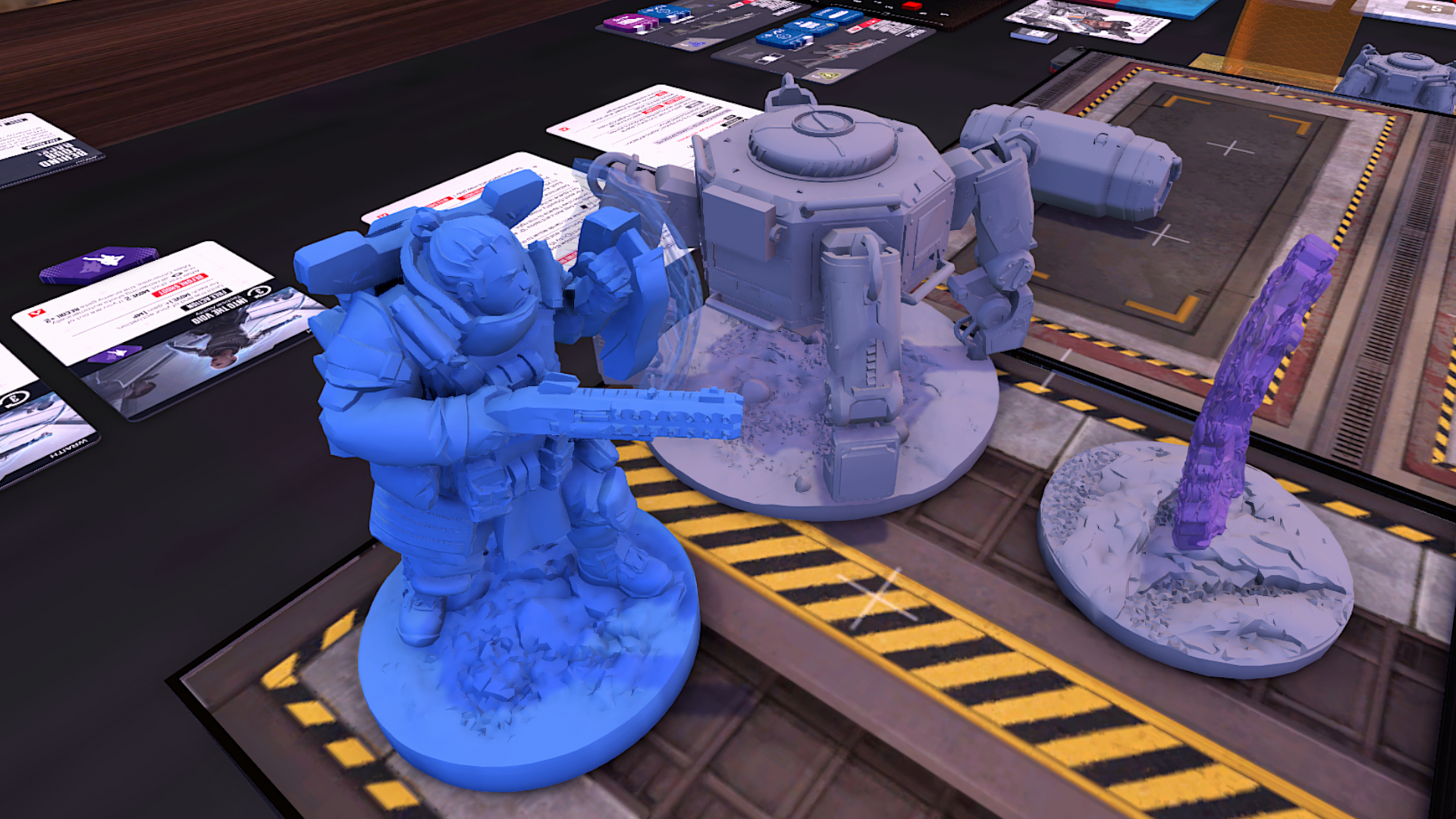
You remember the 4D chess set Spock used to play with in Star Trek? The Apex Legends board game reminds me of that. You've got to be thinking multiple moves ahead at all times, and balancing your plan with what your opponents might do on their next turn - not to mention how you'd then respond. It's a snowball effect of strategy, and enough to make it look like you're re-enacting the confused math lady meme.
This took me a little by surprise when I previewed the Apex Legends board game with its developers, Glass Cannon Unplugged. Don't get me wrong, battle royales are tactical for sure and I knew this version wouldn't be any different (tabletop or not). But games like Apex are perhaps better known for twitch reactions and speed. This adaptation, though? While it feels like its inspiration on a surface level, it leans into the white-knuckle conundrum of when, where, and how to use your abilities - it's a tense head-to-head where you'll endlessly try to outmaneuver each other. That helps set it apart from the countless alternatives fighting to be crowned as one of the best board games.
A legitimate alternative
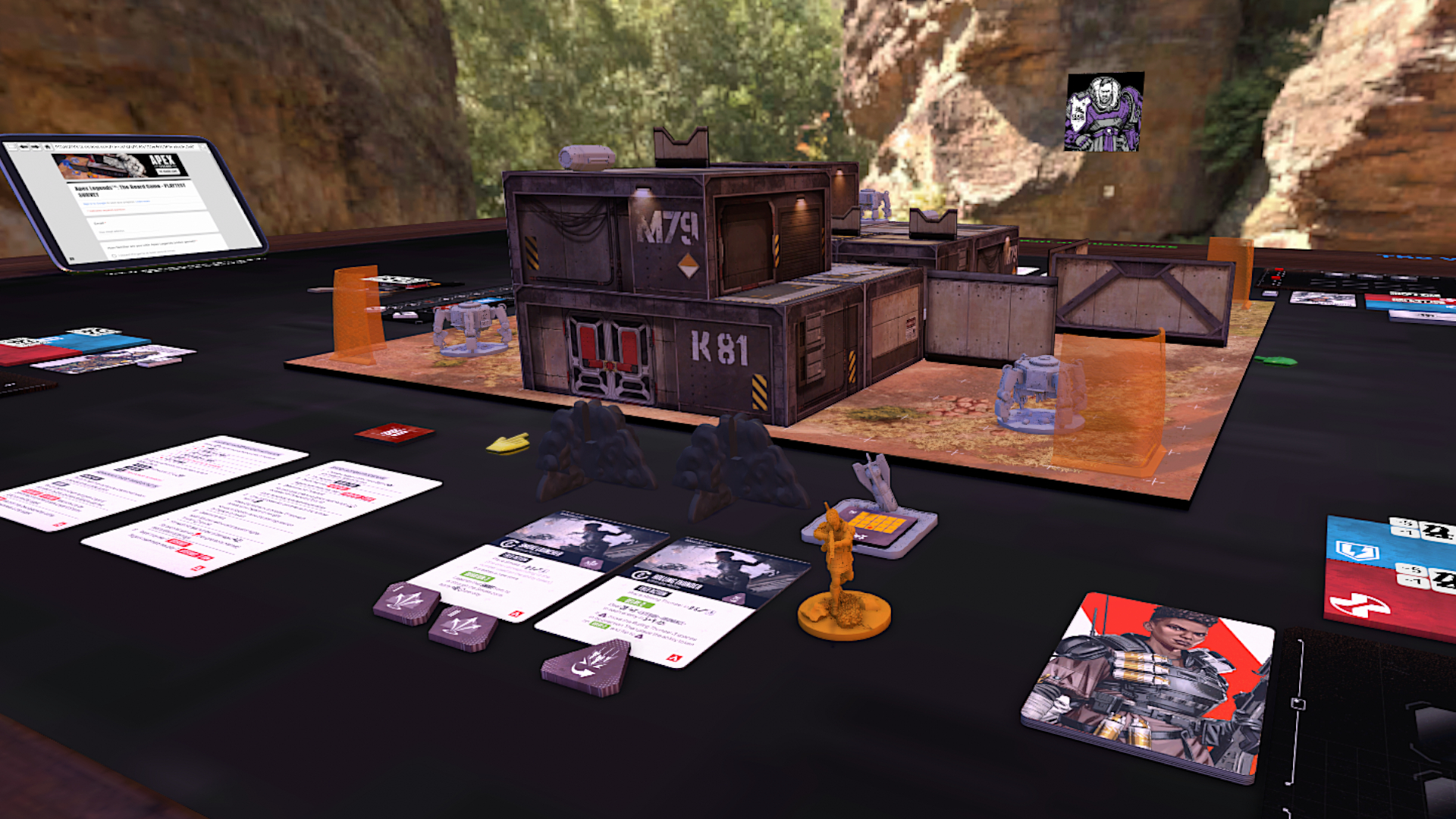
The team came at this project from an unusual angle. In fact, what became 'Apex Legends: The Board Game' (which you can find on Kickstarter) didn't start out connected to Apex at all. Instead, it began life as a nameless battle royale.
The advantage of this is that Glass Cannon was able to develop a really solid foundation which doesn't rely on - and isn't overly slavish toward - the Apex Legends name. This was one of the first things that struck me when taking the game for a test-drive. It doesn't 'just' feel like a way to relive the highs of the FPS; it's a legitimate alternative that taps into strategy only tabletop can provide. If anything, it reminds me more of Warhammer 40K's Kill Team or Age of Sigmar's Warcry than anything else.
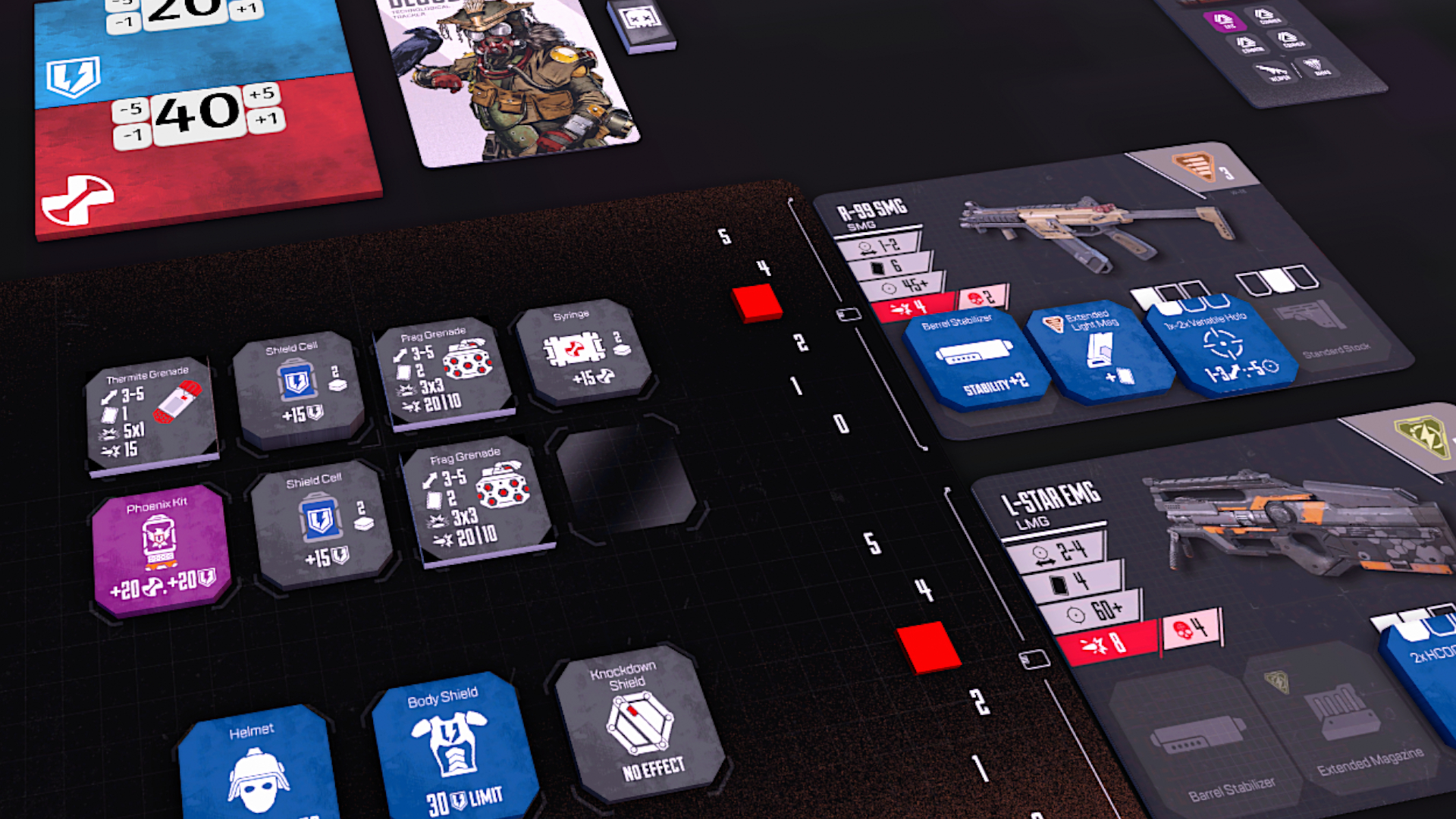
Even though you don't drop empty-handed as per the video game, it's still a good idea to think about where you'll be landing. Depending on the side of the board you choose, you might get special items to upgrade your gear right off the bat.
Considering Glass Cannon's staff, this isn't surprising. Many are dedicated Warhammer fans, and the cabinets behind one of my hosts, CEO Jakub Wiśniewski, were filled with painted miniatures. That passion helped define the direction of what would become Apex Legends: The Board Game - fixing issues they found irritating about the games they love.
"In our company, half of us are avid war gamers," Wiśniewski tells me. "And one of the assumptions that we had for this project was that we wanted to have everything packed into one box like a board game. And we wanted to take out all the biggest, let's say, problems that newcomers have for skirmishes. So big complex rules, unclear line of sight, fiddly dice and so on."
When you throw in the classic shrinking battlefield, the Apex Legends board game ends up having a very distinctive voice - it's able to cut through the noise in a way I wasn't expecting.
We have, I think, a very unique system I haven't seen in any other game
Joanna Kijanka, developer
However, that's not to say it doesn't feel like classic Apex too. As someone who plays Trios or Ranked matches with friends most weeks, I came away impressed by how familiar this board game for adults is. While it's not exactly the same (you drop with a couple of random weapons already equipped, for example), character abilities are identical and each Legend responds how you'd anticipate. As a case in point, I'm a Lifeline or Gibraltar main and using the latter here was like putting on a pair of comfy slippers. Although there are a few new abilities via cards (which still hew close to the characters' powerset), that shorthand let me quickly dig into the strategy of it all once I'd gotten my head around the rules. For instance, my Wraith teammate and I were able to get creative with their portal for surgical strikes using Thermite grenades that'd flush out our foes before warping back to cover and the protection of my dome shield.
Breaking cover
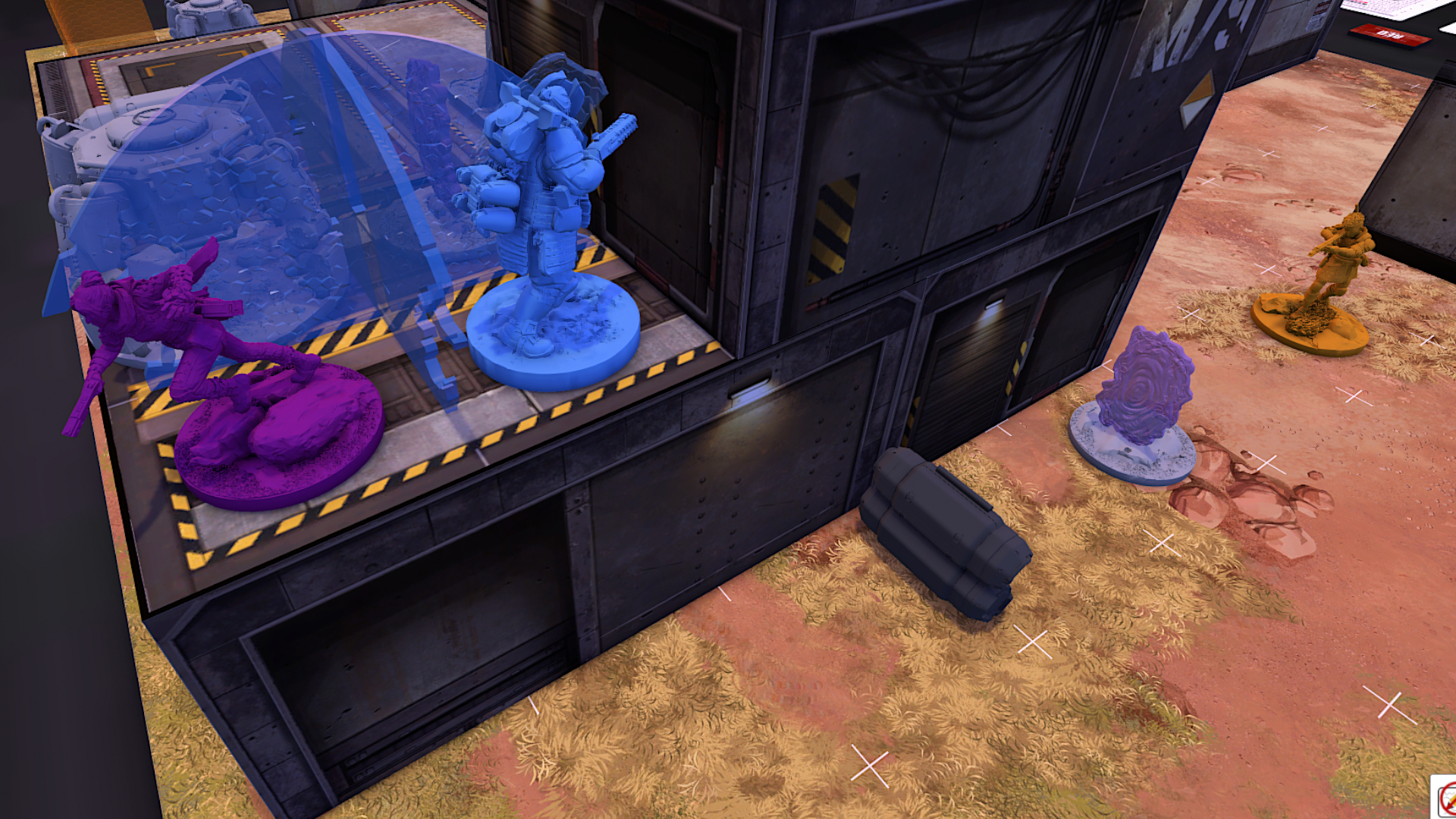
Speaking of the rules, Apex Legends: The Board Game handles combat differently to most other wargames. Your guns have ranges and damage points, yes, but there's no die to be seen when you're calculating hits.
"We have, I think, a very unique system I haven't seen in any other game," says developer Joanna Kijanka. "We will draw cards that have a value on them, and if our weapon is on the same value or above, we actually have a hit."
Although this may not sound too different to dice rolling at first blush, it differentiates itself with a host of other mechanics that keep things interesting.
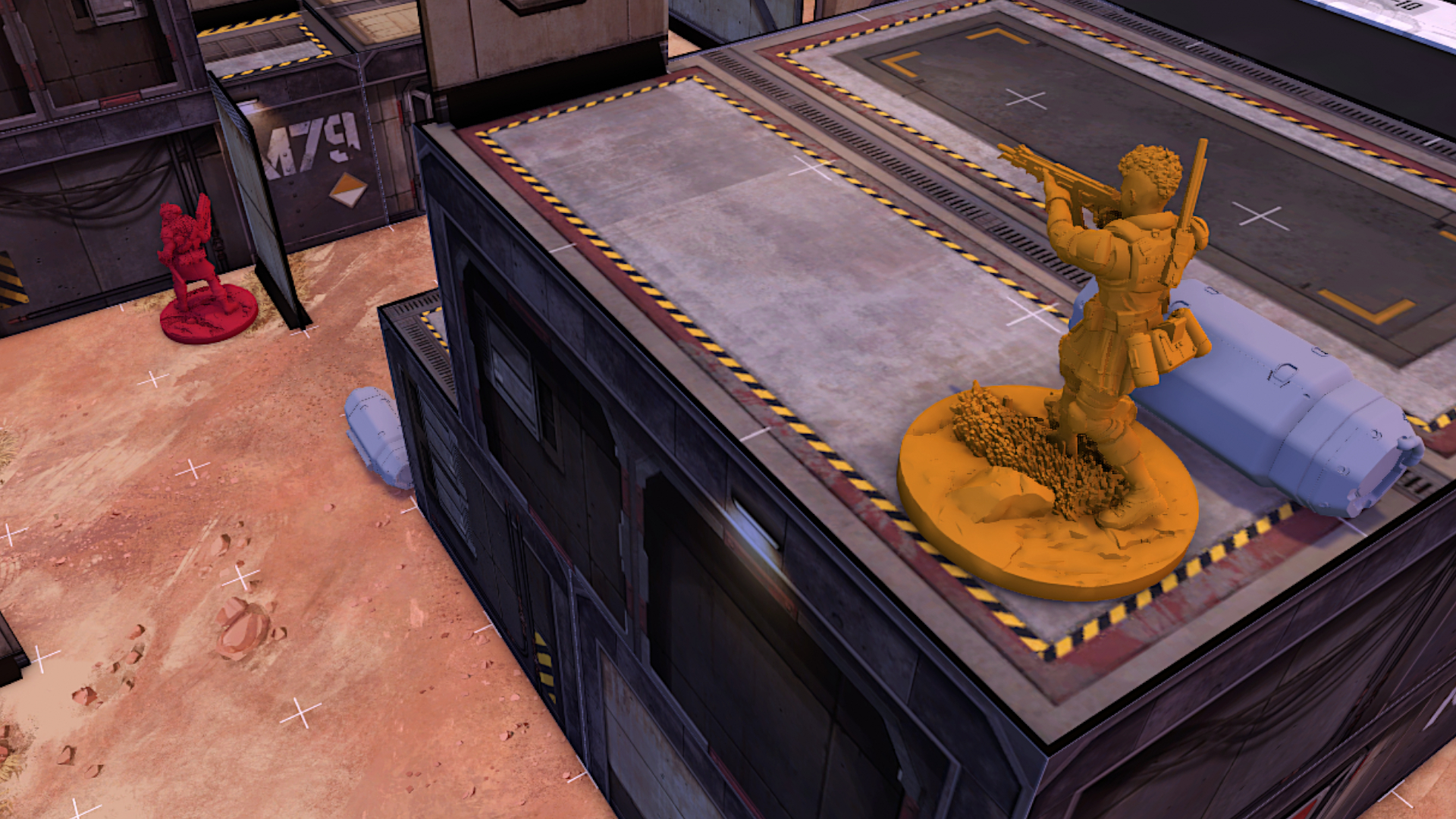
Working out range is easy in tabletop Apex Legends. Rather than using tape measures or rulers, it opts for a system reminiscent of battlemaps from the best tabletop RPGs - the board is divided into squares. Each weapon has its own range in squares, so you simply count the distance between your model and target in order to see if you can hit it.
"We wanted to have some mechanic that would reflect the uncertainty of shooting [your] weapon but also that would reflect what's happening in the video game. Hence, we came up with the idea for the shooting track that simulates the weapon recoil," Wiśniewski adds.
This is where the board game truly starts to find its feet. To represent your gun bucking and drifting off-target when fired, cards are placed on a shooting track with zero in the middle, minus numbers to the left, and positive numbers to the right. Your first card is put on zero, and everything after that goes onto the minus side with increasingly heavy penalties. The longer you spray-and-pray, the less likely it is you'll strike true.
While there's still a random factor to all this in terms of what you draw, it's a novel alternative. Particularly because those cards might have icons that are activated under certain circumstances. Some allow you to hit regardless if you have high ground, others provide headshot damage, and so on.
We wanted to take out all the biggest, let's say, problems that newcomers have for skirmishes
Jakub Wiśniewski, CEO
Throw in customization and you've got a pretty meaty system. Much like the video game, you're able to find extra armor, weapons, healing items, or gun upgrades in bins scattered around the map, and they stack in a satisfying pile on your character board (which is laid out in the same way as the original game's backpack). Because these make you steadily more accurate, stronger, or reduce recoil, there's an instant hit of dopamine as you level up throughout the course of a match. In a cool twist, it adds to the tension as well; you've got to weigh up the advantage of a bonus vs the risk of breaking cover to get it.
Nothing beats the rush of being able to time an area-of-effect attack that pushes enemies into the closing ring, though. I was able to do this and force the opposing team into a kill-box toward the end of my session, and let me tell you, it gave me one hell of a confidence boost. Thinking a few moves ahead and trapping your rivals with a well-timed blow (or working in tandem with your allies to deliver a devastating one-two punch) is awesome.
Because the addition of other Legends - which will be available via expansion packs - should force you to keep adapting like this, the future seems bright for the Apex Legends board game. We're still a ways off from launch, but I left my preview much more optimistic than when I went in. The layers of strategy - much like that multi-tiered 4D chess board - give it a depth I wasn't expecting to see.
For more tabletop recommendations, check out these essential board games for 2 players and must-have cooperative board games. As for other wargames, you can check out our deep dive on designing Warhammer 40K 10th edition.







